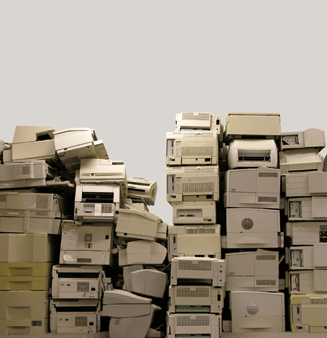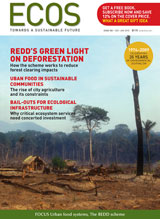
|
Published: 20 December 2010
Breakthrough in national policy for e-waste
Industry associations and environment groups concerned about the mounting problem of e-waste – discarded computers, monitors, TVs and other electronic products – welcomed the announcement of a National Waste Policy by state and federal environment ministers in November.1

|
|
A stack of discarded printers – under new national legislation, TV and computer equipment producers will be responsible for collecting and recycling their e-waste. Credit: istockphoto
|
Through a public communiqué, the ministers said the policy’s focus on product stewardship aims to reduce the environmental, health and safety footprint of manufactured goods through better design, manufacture, supply chain management, consumption and recycling/disposal.
In welcoming the announcement, Australian Information Industry Association (AIIA) CEO, Ian Birks, said the new national policy provides for the establishment of a co-regulatory framework, involving industry and government, with clear penalties for companies that fail to comply.
AIIA – a participant of the Victorian Government’s earlier pilot Byteback e-waste recycling scheme – is now working with its members to establish a government-accredited national ‘producer responsibility organisation’ for the computing and IT sector.
The AIIA has proposed an extended producer responsibility (EPR) scheme under which computer equipment manufacturers would be responsible for collecting end-of-life equipment and meeting a recycling target of 80 per cent by 2021.
Sony Australia and Panasonic Australia, both members of industry association Product Stewardship Australia – whose membership includes manufacturers of TVs and consumer electronics – issued media releases supporting the environment ministers’ decision.
Dave West, National Campaign Director of the Boomerang Alliance – an EPR campaign involving Australia’s leading environment groups – said the national waste policy ‘is an opportunity for recycling to lead the much needed momentum for Australia’s green economy’.
Environment Victoria campaigner Fraser Brindley said the decision was timely, as Australians already send more than 14 million televisions and computers to landfill each year.
‘Televisions, computers and all other e-waste are a problem in landfill because of the variety of chemicals that they contain,’ he commented. ‘Recycling e-waste keeps toxins out of landfill. But it also recovers valuable resources and creates jobs.’
A report by Environment Victoria and the Total Environment Centre earlier this year showed that a national television and computer recycling scheme would create at least 2200 new jobs, a figure that could rise to 5300 if mobile phones, DVD players, cameras and all other e-waste items were included in such a scheme.
1 ‘National waste policy: less waste, more resources’ – see http://www.ephc.gov.au/taxonomy/term/86



